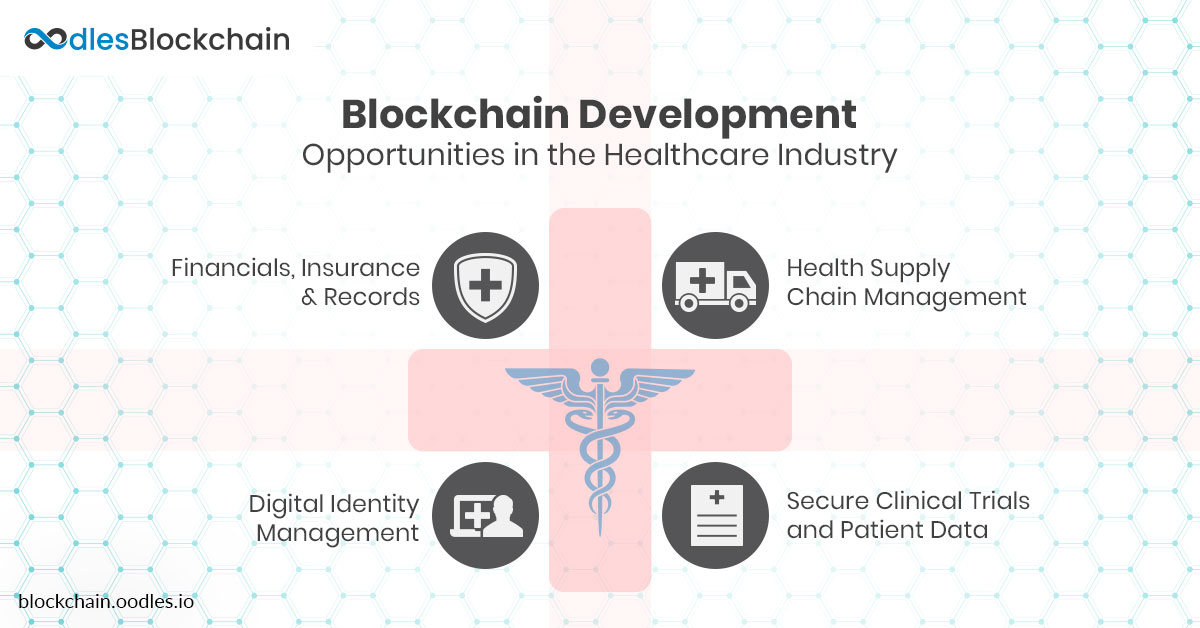-
The healthcare industry is struggling with several challenges like counterfeit drugs and inefficient supply chains. It is difficult to track products and determine their authenticity from provenance to hospitals and patients. For the healthcare industry players, it has become critical to resolving issues like traceability and compliance using appropriate technologies.
It is possible to enhance trust between all stakeholders in the value chain with blockchain application development in healthcare. Blockchain is a distributed ledger technology that drives industries to develop applications that achieve efficiency, improve transparency, and establish trust in the network.
How blockchain application development in healthcare tackles known issues
Blockchain application development in healthcare provides enhanced control and visibility to improve supply chain traceability and tackle counterfeit drugs. Moreover, the use of smart contracts automates drug supply chain operations to increase efficiency with significant cost reduction.
Let’s explore how blockchain development in healthcare provides universal access, integrity, security, traceability, and interoperability.
Interoperability
HIS use different set of protocols and standards like CDA, FHI, HL7 2.x to maintain data accessibility across various healthcare organizations. However, it leads to complexities when you want to integrate new systems or platforms. The solution to this problem is blockchain. It solves interoperability related issues by serving as a decentralized database. Permissioned stakeholders from external networks access data through APIs developed with a focus on the standard data format. Blockchain also works seamlessly with existing platforms and protocols to access and store data.
Integrity
Blockchain preserves data integrity across all levels. It prevents healthcare systems from creating multiple instances of obsolete patient data. Once you upload data to blockchain, it cannot be altered for any malicious reasons. Only the patients get permissioned access to data while availing healthcare services.
Security
The healthcare industry has always suffered from data leaks, tampering, and theft, resulting in huge financial losses. Blockchain offers better security than existing healthcare applications. It uses data encryption model with private keys to safeguard data stored on the platform in any form. It permits only receivers to access information content using private keys.
Maintenance Cost
Maintenance cost is another integral problem that the existing healthcare systems are facing. They require maintenance across different operations and need to ensure that all functions run smoothly. Blockchain eliminates this problem with its distributed decentralized network. It ensures that there is no single point of failure. If a node fails to operate, other nodes can fetch data as they also get the same copy of data stored on the network. An additional benefit of having a copy of the database on each node is that information retrieval becomes fast and cost-efficient.
Universal Access
Blockchain provides universal access to data for all its users. It eliminates the dependence on any central authority, which makes universal access feasible. Moreover, regulatory authority can access data for compliance checks and audits.
Blockchain application development in healthcare: Use cases and solutions
Electronic Health Records (EHRs) Management
Blockchain based electronic healthcare records (EHRs) solutions enable secure data exchange among medical communities. They provide the following benefits -
- Safeguard patient data and ensure privacy with cryptography and p2p transfer mechanisms
- Make any research work done by doctors over their patients’ medical histories visible to all stakeholders
- Provide researchers with a common platform to use shared clinical research data for scientific progress
Patient Permission Management
Blockchain enables distributed data ownership with privacy and permission layers. While patients cannot alter specific medical profile data provided by doctors, they can grant full or partial visibility to healthcare stakeholders. For instance, patients can share their complete copy of records with healthcare specialists. Concurrently, they may share only non-identifiable data with scientific research firms.
Drug Traceability
Blockchain makes medical supply chain management more secure and accountable with transparency, immutability, and interoperability. These blockchain attributes ensure smooth interaction between different applications and systems along the supply chain. Also, they enable pharmaceutical companies to register products on the database to trace their movement from provenance to end customers.
Data Security in Clinical Trials
Blockchain reduces data frauds by provisioning the use of specific consensus mechanism and decentralized structure, which protect against hacks or manipulation. With documents’ proof-of-existence and verification-of-authenticity stored on the blockchain platform, stakeholders can ensure data integrity, promote trustworthy clinical trial results, and enhance collaboration in the research community.
Incentivization through Micropayments
Blockchain enables the use of efficient micropayment systems to incentivize patients for their specific behavior with smart contracts. These contracts distribute rewards to patients for completing tasks like maintaining a certain treatment plan or sharing data for clinical trials.
Insurance Claims and Billing
Blockchain can enhance healthcare billing and insurance claim processes. It can prevent health providers from overcharging a patient for services or adding a service without prior consent.
Blockchain also improves insurance claim management by reducing the time from months to a few minutes to process claims. It makes it possible by removing intermediaries and automating all insurance claim processes with smart contracts.
Conclusion
While the use of blockchain in healthcare is still in infancy, we can expect revolutionary improvements in the coming years. Blockchain application development in healthcare has created opportunities to devise new solutions and enhance existing complex processes.
If you’re also considering to develop a blockchain based healthcare application, talk to our seasoned blockchain developers at Oodles. We are a blockchain development company that has developed multiple blockchain applications using several technologies.
It is not necessary to develop healthcare applications with one blockchain technology. Instead, it is more effective to develop them by combining features of other blockchain technologies.
Our blockchain team is adept in working with platforms like Stellar, Hyperledger, EOS, Ethereum, and Corda. We use these platforms to build healthcare systems that have innovative features. We work with our clients as their technology partner to provide guidance at every stage from evaluation to production.

Our Offices
INDIA
Emaar Digital Greens, Sector 61,
Gurugram, Haryana
122011.
Welldone Tech Park,
Sector 48, Sohna road,
Gurugram, Haryana
122018.














